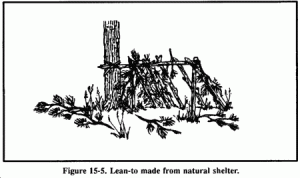The keys to survival are planning and mental preparation. The old saying goes that “if you fail to plan, then plan to fail.” Many trips to the bush have gone wrong simply because people failed to plan… and sometimes the consequences were fatal. Survival is really all about common sense.
People can write long articles on how to survive and that’s not a bad thing, but at the end of the day survival essentially boils down to following these 5 priorities. In other words, one could survive out in the wilderness using just these tips (and the will to live) – and the truth is people actually have in real life situations.
Water
Our bodies are 70% water. Losing just 1% of body fluids affects the thermoregulation system – dehydration then sets in which can lead to death. Water can be collected from streams, creeks, waterholes and various other water sources including tree branches (to do this tie a bag around a tree branch that is in direct sunlight, wait 4 hrs and you should get at least a cup of potable drinking water). All water collected must first be clarified using a piece of cloth (this could be your t-shirt, bandanna, a sock and even your underwear) and purified using a method such as boiling over an open fire for no less than one minute or using a commercially produced filter such as the ones made by
Katadyn.Drinking your urine is something that you shouldn’t do. Uric acid isn’t really that great for your body. Bear Grylls might do it on TV, but you’ve got to remember that his shows are purely for entertainment and not for educational purposes. People have survived in the outback by drinking their own urine and they didn’t die. This should only be done in extreme circumstances and as a last resort. It is better not to even get to that point in the first place.
The colour of your urine is a good indicator of whether your body is getting adequate hydration. If it is pale yellow, then that means your good to go, if it is darker then you should be getting fluids back into your body ASAP.
Warmth
We all need to keep warm. If a person loses 80% of his core body heat, hypothermia will kick in. Having suffered from hypothermia on three occasions, I can tell you that it isn’t a very pleasant experience and it is also a condition that is life-threatening.
A fire is something that among other things (including providing light and boosting morale) conveys warmth to our bodies – so get a good teepee fire going. Fire can be achieved using friction such as a bow drill or a plough, flint and steel, matches or a BIC lighter or even using a 9V battery and steel wool.
Brew a cup of tea or coffee. Obviously, this should warm you up but it also does two other things 1) diverts your attention to something else 2) boosts morale.
 Shelter
Shelter
Always look for natural shelters in the environment. Look for caves, natural depressions in rocks, trees etc If natural shelter is available, take advantage of it. If you are unable to find a natural shelter, a simple lean-to shelter can be constructed with tree branches in the configuration depicted in the diagram to the right.
Signals
If you see an aircraft or helicopter flying overhead, use the signalling mirror from your
survival kit or a car mirror to flash the sun’s reflection at the aircraft. Remember that 3 whistle blasts, flashes of light, flares and smoky fires in a triangle are all universally recognised distress signals. Don’t waste your energy on screaming for help! Setup a tinsel tripod (using brightly coloured, reflective bits and pieces), draw/write directional arrows or ground-to-air messages (using sticks and rocks or create the letters with your hands in the dirt or sand) to attract attention from people both on land and in the air.
Food
Food is at the bottom of the list because it is not as high a priority as the others before it. One can go without food for 72 hrs quite easily although it wouldn’t be pleasant. It is a good idea to learn what plants are edible in the area you intend to trek through and familiarise yourself with them.
Bonus Survival Tips
- Drink, don’t sip your water – Sipping water must be one of the single biggest killers in the outdoors
- Keep calm, don’t panic – In a survival situation, it is crucial that you maintain a level head at all times. If you lose your cool and panic, then you end up making bad decisions which could ultimately get you and anyone else with you, killed. Learning to control your emotions can be a great asset in an emergency. Fear of the unknown often causes people to behave irrationally and make poor decisions. Even if you have the knowledge of what to do in a survival situation, fear can override commonsense severely impairing your judgment.
- Stay with your resources and vehicle (even if it’s broken down). Don’t forget to put the vehicle’s bonnet up. This is a sign that you are stranded and need assistance.
- Never leave home without a survival kit, detailed/up-to-date maps, adequate water and appropriate clothing. Be prepared for inclement weather.
 Shelter
Shelter